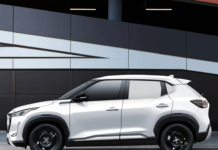At the North American International Auto Show, KIA Motors America (KMA) hosted the global debut of the all-new 2019 Cerato (also known as the Forte in the USA and the K3 in the Korean Domestic Market), which enters its third generation with a more sophisticated design and desirable features that transforms one of KIA’s best-selling vehicles into something more than a compact car meant for getting people from one point to another. Thanks to a number of improvements, Cerato now offers drivers a higher level of comfort, fuel efficiency and advanced driver assistance technologies that are aimed to make the journey – whether a short commute or long haul – a more rewarding and decidedly upscale experience.
The Cerato has evolved with a number of visual and feature enhancements, inside and out. The cabin is now more comfortable and “class above,” and integrates new driver assistance technology. In addition, the Cerato ups its efficiency game with an all-new powertrain that utilises KIA’s first IVT, set to deliver an estimated 35 MPG combined (equating to approximately 6,7 litres/100km).
“The compact sedan segment is highly competitive, but with all the improvements the new Cerato brings to market, it is more than prepared to take on the toughest the segment has to offer,” said Orth Hedrick, vice president, product planning, KMA. “As one of our top-selling models, the all-new Cerato follows some large footsteps, but enhancements in styling, packaging and content make it even more attractive to drivers seeking a compact sedan that can accommodate their versatile lifestyle.”
Standard features and desirable amenities in the compact sedan segment continue to be available across three trims – LX, S and EX – with the model line continuing to expand throughout its lifecycle.
Sophisticated yet sporty design
While the third-generation Cerato retains its sporty and youthful image, it has graduated to a more sophisticated appearance thanks to a number of sleek and dynamic styling cues inspired by the Stinger fastback sport sedan. Lauded in the auto industry for its excellence in design, the Stinger is a product fueled by KIA’s bold and adventurous spirit. Peter Schreyer’s global team of designers translated elements of the Stinger’s design language onto the Cerato to give it a commanding road presence. Enthusiasts know that the right proportions are key, and like the Stinger, Cerato’s long hood and short deck lend it an overall fastback-like shape. The cowl point was moved back five inches, creating a more athletic stance that makes the Cerato appear well-planted to the ground.
Creases in the hood contribute to the Cerato’s muscular appearance and distinctive design traits on the front fascia, including a fresh approach to KIA’s signature tiger nose grille and an aggressive black lower valance, enhance its presence and individual character. The front clip is flanked by a Stinger-esque headlamp design and layout. Separate turn signal indicators are mounted below on the front bumper, where air curtains improve aerodynamic performance and enhance the Cerato’s technical appeal. Around back, the rear bumper gets the same treatment with separate reverse and turn signal indicators located beneath available LED taillights. Similar to the Sportage compact crossover, a sleek horizontal trim piece connects the taillights.
Comfortable Cabin
Creating the fastback shape strengthened the Cerato’s exterior appearance, but it also gave engineers an opportunity to expand the occupant compartment in several key areas so that passengers are treated to a comfortable space no matter how long the journey. Overall length has increased by 81mm to 4,641mm, allowing for more legroom and additional cargo in the trunk. With 428 litres on offer, cargo room is among the largest in the segment and generous enough to accommodate gear for a group of friends on a road trip or a growing family managing a busy schedule. Additional headroom results from increasing the overall height nearly half an inch to 1,440mm, while the overall width has grown to 1,798mm.
While the extra 18mm of width may not be noticeable to the naked eye, the layout of the dashboard paints a picture of a wide interior space. Again drawing inspiration from the Stinger, a horizontal theme creates a sense of openness and avoids clutter with clean lines and minimal buttons that are intuitively placed below an 8-inch colour touchscreen. Aeronautically inspired spoked circular vents adorn the dash and increased soft-touch points create a comfortable and visually appealing cabin. Drivers and passengers alike will appreciate easier ingress and egress, plus improved outward visibility.
Strong Foundation
Building upon an already solid structure that helped the current Cerato sedan achieve an Insurance Institute for Highway Safety (IIHS) Top Safety Pick Plus rating, the all-new Cerato strengthens its bones with additional hot-stamped components and 54% Advanced High-Strength Steel. Stronger seat frames are lightweight and provide a more comfortable seating position with increased lumbar support and denser seat foam for more pleasurable long-distance drives. The all-new Cerato offers projection or full LED headlights and is targeted to receive the highest ratings from the National Highway Traffic Safety Administration (NHTSA) and IIHS.
Because body stiffness plays a major role in NVH performance, engineers worked to increase rigidity for a quieter cabin and better handling tuned to match the Cerato’s sporty and dynamic exterior appearance, resulting in a 16% stiffer body in white. New subframe designs help to improve lateral responsiveness, while steering feel is upgraded compared to its predecessor’s thanks to enhancements within the Motor Driven Power Steering (MDPS) system that reduce artificial steering feel and friction. Reworked suspension geometry provides a quick and nimble behind-the-wheel feel and evolutionary improvements were made to throttle and brake feel performance, yielding a smoother initial response at tip-in and a shorter stopping distance than the previous model.
A More Efficient Powertrain
Housed underneath the Cerato’s longer hood is a second-generation 2.0-litre Nu four-cylinder engine that benefits from Atkinson Cycle technology and a cooled EGR system. Typically applied to hybrid and electric vehicles, the Atkinson Cycle and cooled EGR technologies are designed to help boost fuel efficiency. The new powerplant can be paired with either a six-speed manual or KIA’s all-new Intelligent Variable Transmission (IVT). The engine and in-house-built IVT are the first of a new line of highly efficient “Smart Stream” powertrains that will make their way into the KIA lineup in the future.
Waiting before developing KIA’s own continuously variable transmission (CVT) allowed engineers to research issues often associated with CVTs and apply their findings in the application used in the Cerato. One of the main criticisms is that they can create a rubber-band-like feel, and in an effort to address this issue, engineers built the IVT with adaptive style shift logic with a chain-type belt instead of push belt, a first in the compact class. This results in smooth and linear acceleration, and for a more enjoyable and sporty driving experience, a step-shift-like feel mimics a conventional automatic at wide-open throttle or when more acceleration is needed.
Noise is another issue CVTs can sometimes face and engineers worked hard to reduce this in the Cerato by wrapping the transmission case in a sound-insulating cover to help quiet the typical “drone” associated with this tech from other OEMs. In doing so, NVH levels are also reduced by 5dB.
Horsepower and torque are expected to remain unchanged from the current Cerato, delivering an estimated 110 kW and 179 Nm. Efficiency was the top priority and the IVT, together with the 2.0-litre engine, is estimated to return up to 35 MPG combined (approximately 6,7-litres/100km), about a 3 MPG improvement over the current vehicle. Official EPA fuel economy ratings will be announced closer to the Cerato’s market introduction later this year.
Brimming with Technology
Staying connected with advanced technology and infotainment features allows the driver to dedicate their attention to the road ahead. In that regard, the Cerato comes standard with an 8-inch colour touchscreen with Android Auto™ and Apple CarPlay® that’s integrated neatly on the dash and within the driver’s line of sight. With select smartphone devices, the system also has the capability to read SMS texts aloud through Bluetooth®. Eliminating the need for a charging cord is an available wireless charging tray perched up on the centre stack for compatible Android devices, as well as Apple iPhone 8 and iPhone X.
Another welcome and surprising feature in this segment is an available 320-watt premium sound system developed with Harman Kardon that pumps out music through a unique speaker hole pattern on the door panels and throughout the cabin.
KIA’s suite of Advanced Driver Assistance Systems (ADAS) offered in many of the automaker’s more expensive vehicles make their way down into the Cerato, making it an even more value-laden option for cost-conscious shoppers. In addition to Blind-Spot Collision Warning (BCW) and Lane Keeping Assist (LKA), the all-new Cerato is available with Forward Collision-Avoidance Assist (FCA) and Smart Cruise Control (SCC). Smart Cruise Control is designed to maintain a pre-set distance between the Cerato and the vehicle in front and can slow the vehicle slows with traffic in certain circumstances.
The all-new KIA Cerato is likely to arrive in South Africa towards the end of 2018.
Provided by KIA SA































